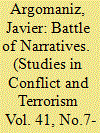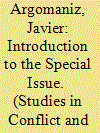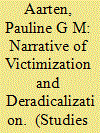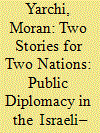|
|
|
Sort Order |
|
|
|
Items / Page
|
|
|
|
|
|
|
| Srl | Item |
| 1 |
ID:
160521


|
|
|
|
|
| Summary/Abstract |
Spanish victims groups have provided a visible contribution to European terrorist violence prevention efforts. Instrumental and knowledge transfer motivations partly explain this interest but a separate driver that requires more attention is their opposition to the international narrative that legitimizes Euskadi Ta Askatasuna's violence promulgated by the political movement of the Basque Patriotic Left. This has resulted in a “battle of narratives” played out at the international level in order to shape the future of Basque politics where victims are challenging a discourse that frames the past in a way that justifies terrorism and that leaves the door open to a future return to violence.
|
|
|
|
|
|
|
|
|
|
|
|
|
|
|
|
| 2 |
ID:
160528


|
|
|
|
|
| Summary/Abstract |
The Great Lakes region of Africa is the most conflict-prone region of the world and one current concern is political violence in Burundi. This research investigates whether Burundi is on the precipice of a genocide. Burundi's weak democratic norms, genocidal history, and the impact of contagion and diffusion of violence in the region provide a number of the conditions that could contribute to a genocide. This research investigates the past and present conflict variables of the Great Lakes region with a focus on Burundi and assesses the potential that the ongoing political violence in Burundi will lead to genocide.
|
|
|
|
|
|
|
|
|
|
|
|
|
|
|
|
| 3 |
ID:
160517


|
|
|
|
|
| Summary/Abstract |
This article attempts to challenge binary notions of “victim” and “perpetrator” categories by taking into account the complex interaction of actors who both participate in, and are impacted by, terrorist violence. Semi-structured interviews were conducted with self-identified Republican (n = 25) and Loyalist (n = 27) ex-prisoners in Northern Ireland who are currently involved in self-described peace initiatives. Results suggest that political ex-prisoners evoke notions of collective victimization as a vehicle to bridge their transition from “paramilitary” to “peace maker” in this context. The implications are discussed in terms of understanding the functionality of collective victimhood for those who controversially adopt the label.
|
|
|
|
|
|
|
|
|
|
|
|
|
|
|
|
| 4 |
ID:
160518


|
|
|
|
|
| Summary/Abstract |
Since 2005, Britain has utilized a handful of interventionists to engage with those at risk of violent extremism and those convicted of terrorism related charges in order to manage its risk of terrorism. The goal of the interventionists is to “deradicalize” those that they interact with to facilitate their reintegration in society. This article discusses the mentoring environment in the United Kingdom, how intervention providers establish their credibility with individuals, communities, and government, some of the structural safeguards and their impact on mentoring, how success is conceived, and the absence of reporting.
|
|
|
|
|
|
|
|
|
|
|
|
|
|
|
|
| 5 |
ID:
160522


|
|
|
|
|
| Summary/Abstract |
This article draws on frame theory to explore the ideational dimensions of the Boko Haram phenomenon. Speech acts by Boko Haram's leaders are analyzed to interrogate how the organization conducts its three core framing tasks. The article argues that Boko Haram deploys three major master frames. These are the return to true Islam frame, the injustice frame, and the war against the infidel frame. Boko Haram's framing strategies draw on the social conditions and cultural reservoir in its domain of operations. This includes antipathy toward the West and Western education, patriarchal beliefs about gender roles and the “place” of women, and the contours of a widely popular Islamic movement that emerged in the early 1800s. Boko Haram's framing approach is also shaped by state repression and the post-9/11 cosmic war discourse. Overall, the article contributes to the limited literature on nonstructural aspects of Boko Haram's terrorist activities.
|
|
|
|
|
|
|
|
|
|
|
|
|
|
|
|
| 6 |
ID:
160527


|
|
|
|
|
| Summary/Abstract |
This article explores the ideological rigidity of secular and religious terror groups. Analyzing leaflets disseminated by two Palestinian groups during the First Intifada, it examines if and how each shifted its identity and goals in response to repression, political shifts, or resource changes. The results suggest that while similar catalysts led to ideological reformation among the secular and the religious group, the extent of ideological change within the religious group was more limited. The article argues for the need to disaggregate ideological analysis further in order to identify more subtle shifts, alterations, and omissions, in the positions held by religious terror groups, moving past the exploration of if such changes exist in ideological templates and instead focusing on the extent and type of alterations the different groups allow.
|
|
|
|
|
|
|
|
|
|
|
|
|
|
|
|
| 7 |
ID:
160516


|
|
|
|
|
| Summary/Abstract |
This special issue examines the complex relationship between radicalization, victimhood. and political violence. The interrelatedness of victims and perpetrators has been long recognized in the fields of criminology and victimology but it is has been often ignored in the case of terrorism and political violence. The key aim of this issue therefore is to assist in enhancing our understanding of this interrelatedness with a particular focus on the relevance of narratives, roles, and identities of victimhood for both the victims and perpetrators. A second, more policy-relevant dimension is to examine the role of victims and perpetrators in the prevention of terrorism and political violence.
|
|
|
|
|
|
|
|
|
|
|
|
|
|
|
|
| 8 |
ID:
160524


|
|
|
|
|
| Summary/Abstract |
This article addresses the relationship between the Revolutionary Armed Forces of Colombia (FARC) and the cocaine trade in Colombia, and implications for the FARC's complete demobilization under the 2016 peace agreement. The article identifies two phases of FARC interaction with drug markets. During the regulation phase (1982–1991), the FARC regulated the coca economy and charged protection rents. During vertical integration (1991–present), the FARC directly participated in drug markets. Contrary to conventional approaches, the article adopts the concept of the security dilemma to argue that FARC integration in drug markets was a strategic response to threats from paramilitaries and narcotics traffickers.
|
|
|
|
|
|
|
|
|
|
|
|
|
|
|
|
| 9 |
ID:
160519


|
|
|
|
|
| Summary/Abstract |
Narrative is intimately connected to victimization and radicalization. Trouble, the notion that drives narrative, is often coupled with victimization: the experience of suffering intentional harm. This experience can play a turning point in the stories that radicals construct about their own lives and thus play a role in their pathway to radicalization. In this article, three main themes of narrative will be further explored in relation to victimization and radicalization: identity, emotions, and culture. Central in this article is the discussion on how narrative can contribute to theory and research into victimological processes in radicalization, while offering new means to further develop key constructs.
|
|
|
|
|
|
|
|
|
|
|
|
|
|
|
|
| 10 |
ID:
160520


|
|
|
|
|
| Summary/Abstract |
While the study of victimology and radicalization mainly focuses on those who suffered from terrorist attacks, this article explores the role of victimological processes in deradicalization. Experts from different international deradicalization initiatives were interviewed. Using the narrative framework with its three key concepts—identity, emotion, and culture—as set forth by Pemberton and Aarten in this issue, the relationship between victimization and deradicalization is more thoroughly examined. Key findings include the delicacy of the term “victim” in radicals' narrative identity, the power of narrative in triggering and transmitting emotions, and the importance of a former radical that acknowledges the narratives of the radical and offers alternative narratives to their radicalized ideologies.
|
|
|
|
|
|
|
|
|
|
|
|
|
|
|
|
| 11 |
ID:
160525


|
|
|
|
|
| Summary/Abstract |
Does individual-level exposure to political violence prompt conciliatory attitudes? Does the answer vary by phase of conflict? The study uses longitudinal primary datasets to test the hypothesis that conflict-related experiences impact conciliation. Data were collected from Israeli Jews, Palestinians, and Protestants and Catholics in Northern Ireland. Across both contexts, and among both parties to each conflict, psychological distress and threat perceptions had a polarizing effect on conciliatory preferences. The study highlights that experiences of political violence are potentially a crucial source of psychological distress, and consequently, a continuing barrier to peace. This has implications in peacemaking, implying that alongside removing the real threat of violence, peacemakers must also work toward the social and political inclusion of those most affected by previous violence.
|
|
|
|
|
|
|
|
|
|
|
|
|
|
|
|
| 12 |
ID:
160529


|
|
|
|
|
| Summary/Abstract |
Abu Mohammad al-Maqdisi is one of the most important spiritual fathers of the ideology and movement that has come to be known as Salafi-jihadism. Based on primary source materials produced by al-Maqdisi and other important relevant actors at different times and places, this article shows how he developed the ideas that have influenced his disciples and protégés, most prominently Abu Mus'ab al-Zarqawi, the founder of Al Qaeda in Iraq and “godfather” of the Islamic State, and Turki al-Binali, the Islamic State's current Grand Mufti. It also explains how and why, in later years, his disciples turned against him and, despite his repeated efforts, refused to allow him to play the role of the “critical friend,” much less regain control of the movement. The article seeks to expose the intra-jihadist frictions and debates involving al-Maqdisi during different times and contexts, especially the more recent ones between him and Islamic State of Iraq and the Levant. Indeed, it becomes obvious how al-Maqdisi has been trying to regain his lost influence and relevance among the most radical strands within his chosen movement for years. What this shows is that, amidst the fast-changing environment in which Salafi-jihadism has evolved, praxis trumps theory, and a reputation of steadfastness, zealousness, and unwavering convictions matter more to prospective radicals than a reputation of religious knowledge and scholarship.
|
|
|
|
|
|
|
|
|
|
|
|
|
|
|
|
| 13 |
ID:
160526


|
|
|
|
|
| Summary/Abstract |
A substantial part of asymmetric conflicts is the “image war” that takes place in the foreign media. This study examines the circumstances that explain the degree to which political actors successfully promote their preferred frames regarding the conflict in which they are involved to the foreign press. The study examines Israel and the Palestinians’ ability to promote their messages in various events over the last decade. Seven factors were examined, divided into three groups: focal event factors, political context factors, and message context factors. Separate examination of each predictor, followed by analysis of their shared effect, reveals that most factors have an impact on how successful political actors are at promoting their preferred frames to the foreign press. Our findings suggests that the media place greater emphasis on focal event factors when covering conflicts, and that events have a greater impact than cultural assumptions in terms of how foreign media frame news stories.
|
|
|
|
|
|
|
|
|
|
|
|
|
|
|
|
| 14 |
ID:
160523


|
|
|
|
|
| Summary/Abstract |
Research on negotiating with criminalized actors generally assumes the criminal label as a given, neglecting the significance of criminalization itself. This article addresses this gap arguing that the processes of criminalization and decriminalization embody important incentive structures affecting peace negotiations. Specifically, for conflict transformation to effectively occur, criminalization needs to be orientated away from a criminalization of actors and on to specific acts to legitimize nonviolent political expression and negotiations. These arguments will be advanced through a comparative study of Northern Ireland and South Africa, adopting a conflict transformation framework, and drawing on original interviews and archival material.
|
|
|
|
|
|
|
|
|
|
|
|
|
|
|
|
|
|
|
|
|